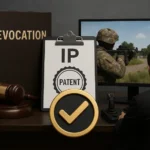Arbitration Closes, Licensing Resumes: What InterDigital’s Win Over Samsung Means for SEP Strategy
- Updated on: Jul 30, 2025
- Read 4 minutes
By
- Published on Jul 30, 2025
On July 29, 2025, InterDigital, a global R&D powerhouse in wireless and video technologies, announced the successful conclusion of its binding arbitration with Samsung Electronics. The dispute, which arose after the expiration of Samsung’s prior patent license at the end of 2022, has now been resolved with the execution of a new license agreement. Though the financial and structural terms remain confidential, the outcome marks a significant strategic win for InterDigital, and a notable precedent in the high-stakes world of standard-essential patent (SEP) licensing.
On the evening of July 29, 2025, InterDigital announced the conclusion of its arbitration with Samsung and filed a Form 8-K with the U.S. Securities and Exchange Commission (SEC), underscoring the material financial impact of the outcome.
A Quiet Victory With Loud Implications
InterDigital’s licensing model rests on a simple, yet increasingly contentious, premise: companies that commercialize wireless and video-enabled devices must pay for the foundational IP that enables those technologies. When its license with Samsung expired, both parties agreed to enter binding arbitration, a process often used when licensing negotiations hit a deadlock, particularly around royalty rates or FRAND (fair, reasonable, and non-discriminatory) terms.
For over two years, InterDigital operated without a license in place with one of its longest-standing licensees. This created a gap in revenue from one of the largest global implementers. However, the conclusion of the arbitration, with both parties now locked into a new agreement, demonstrates that even tech giants like Samsung ultimately recognize the strength and enforceability of InterDigital’s IP portfolio.
The arbitration panel awarded InterDigital a total of $1.05 billion in royalties for an eight-year patent license covering the period from January 1, 2023, to December 31, 2030. This translates to approximately $131 million in annual recurring revenue, representing a 67% increase over the previous license terms. In Q2 2025 alone, InterDigital will recognize $119 million in catch-up revenue—reflecting underpayments during the arbitration period—on top of $33 million in standard quarterly revenue.
Samsung has lost this binding arbitration against InterDigital over royalties for its mobile device business. The arbitration panel has awarded InterDigital a total of $1.05 billion for an 8-year license (2023–2030), which translates to $131 million per year — a 67% increase from the prior agreement.
This outcome marks a significant financial win for InterDigital and a strategic setback for Samsung, especially as it comes amid Samsung’s broader disputes over SEP royalties with ZTE. The timing weakens Samsung’s negotiating leverage elsewhere.
InterDigital will also receive a $119 million catch-up payment to compensate for underpayments during the 2.25-year arbitration period. Samsung had continued to pay the old rate during arbitration, but now owes the difference based on the new, higher rate.
The arbitration award is final and enforceable, with Samsung not challenging the decision, which further affirms InterDigital’s position. Unlike litigation, arbitration left no further recourse unless misconduct could be proven—which Samsung didn’t allege.
Why This Is a Win for InterDigital and SEP Holders at Large
For InterDigital, this resolution not only restores a valuable licensing stream but also reaffirms its negotiating position in the global FRAND ecosystem. Unlike litigation, arbitration is typically faster, less public, and seen as a more neutral ground, especially useful when dealing with high-profile licensees who may be reluctant to enter court battles. That Samsung ultimately accepted a new license post-arbitration validates the long-term viability of InterDigital’s licensing program.
For the broader industry, the case is a reminder that arbitration, when structured well, can deliver clarity without the delay or reputational damage of drawn-out litigation. In fact, for many SEP holders, arbitration is fast becoming the dispute resolution tool of choice, especially in jurisdictions with less predictable court outcomes for FRAND matters.
Impacts on FRAND and SEP Negotiation Dynamics
This case also has deeper ramifications for how future SEP negotiations may unfold. The trend toward arbitration as a standard path to resolve royalty disputes, rather than an exception, is growing, particularly in global licensing contexts where enforcement across jurisdictions becomes challenging.
Samsung’s willingness to enter arbitration and accept its outcome sets a cooperative example that other implementers may follow. For SEP holders, especially those dealing with implementers that delay or refuse to engage constructively in licensing talks, this reinforces the strategic utility of incorporating arbitration clauses into licensing frameworks.
More importantly, it underscores that even the largest implementers cannot indefinitely avoid the licensing obligations tied to FRAND commitments, provided the IP is strong and the portfolio is defensible.
Competitive Intelligence: Who Else Is Playing This Game?
This isn’t the first time binding arbitration has steered SEP disputes toward resolution. In fact, several cases over the past decade illustrate a growing pattern:
- Nokia vs. Oppo (2023): The two companies reached a licensing deal after cross-border patent litigation and arbitration proceedings.
- Ericsson vs. Apple (2022): While the case ultimately settled through litigation, Ericsson initially pushed for arbitration to determine global FRAND rates.
- Sisvel vs. Xiaomi: The Sisvel pool’s use of arbitration has led to numerous resolutions with Asian implementers reluctant to license European SEPs outright.
These cases reflect a shift: SEP owners are no longer relying solely on courts. Arbitration is now an embedded part of high-value patent strategy — both for assertion and for negotiation leverage.
Closing Insight: For Patent Owners and Innovators
At Maxinov, we believe that this case is not just a point of news. It is a signal. The InterDigital-Samsung outcome shows that SEP holders who are prepared legally, technically, and strategically can withstand pushback from even the largest global players. It also shows that arbitration can be a favorable path when traditional negotiations stall.
For startups and mid-sized patent owners entering the wireless, AI, or video encoding space, this is an invitation to structure licensing programs from day one with arbitration readiness, enforceability, and strategic clarity in mind.
As the IP ecosystem grows more global and implementers more sophisticated, such foresight will define the difference between patents that sit on the shelf and those that deliver returns.







No comment yet, add your voice below!